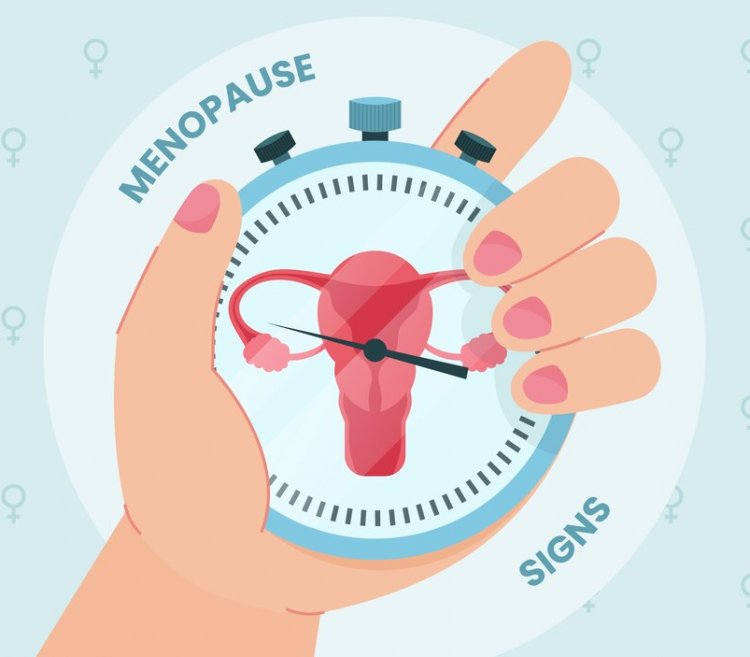Transitioning Gracefully: Managing Menopause with Confidence
Menopause is a natural biological process marking the end of menstrual cycles in a woman's life, typically occurring around the age of 45-55 years. It signifies the cessation of fertility and is a significant transitional phase that women experience. Understanding menopause is crucial for women's health as they navigate this transformative period.

Understanding Menopause
Menopause unfolds in three distinct stages:
Perimenopause:
This phase can start several years before menopause when the ovaries gradually produce less estrogen. Women may experience irregular periods and various symptoms as hormone levels fluctuate.
Menopause:
Officially diagnosed after 12 consecutive months without a menstrual period. Estrogen levels decline significantly, leading to pronounced physical and emotional changes.
Postmenopause:
The phase following menopause where hormone levels stabilize at lower levels, and symptoms typically become less intense but can persist for years.
Hormonal changes during menopause are primarily driven by the aging ovaries and a decline in estrogen and progesterone production. These changes affect not only reproductive function but also have broader implications for overall health.
Symptoms and Signs
Menopause is characterized by a diverse array of symptoms that can vary widely among women:
Physical Symptoms:
- The hallmark symptom is hot flashes, sudden sensations of heat that can be accompanied by sweating and palpitations.
- Night sweats disrupt sleep and contribute to fatigue.
- Vaginal dryness, itching, and discomfort can impact sexual health and quality of life.
- Irregular periods, including shorter or longer cycles and changes in flow, are common.
Psychological Symptoms:
- Mood swings, irritability, anxiety, and depression are prevalent during menopause, often attributed to hormonal fluctuations.
- Cognitive changes such as forgetfulness and difficulty concentrating may also occur, affecting daily functioning and productivity.
Other Effects:
- Sleep disturbances, including insomnia and disrupted sleep patterns, are common.
- Changes in libido and sexual function can strain intimate relationships and affect self-esteem.
- The cumulative effect of these symptoms can significantly impact a woman's physical, emotional, and social well-being.
Health Risks and Concerns
Postmenopausal women face heightened risks for several health conditions:
Bone Health:
Estrogen deficiency contributes to bone density loss, increasing the risk of osteoporosis and fractures. Adequate calcium and vitamin D intake, along with weight-bearing exercise, are crucial for maintaining bone health.
Cardiovascular Health:
Estrogen plays a protective role in cardiovascular health, and its decline post-menopause may increase the risk of heart disease and stroke. Lifestyle modifications, including a heart-healthy diet and regular exercise, are essential for managing cardiovascular risks.
Cognitive and Mental Health:
Hormonal changes can affect cognitive function, potentially leading to memory lapses and difficulty concentrating. Mood disorders such as depression and anxiety are common and require comprehensive management strategies to support mental well-being.
Management and Treatment Options
Effective management of menopause symptoms involves a multifaceted approach:
Lifestyle Modifications:
Adopting a balanced diet rich in fruits, vegetables, whole grains, and lean proteins supports overall health. Regular physical activity, including aerobic exercise and strength training, helps manage weight, strengthen bones, and improve cardiovascular fitness. Stress reduction techniques such as mindfulness, yoga, and deep breathing exercises alleviate symptoms and enhance well-being.
Medical Therapies:
Hormone replacement therapy (HRT) remains a cornerstone treatment for managing severe menopausal symptoms. It involves supplementing estrogen alone or in combination with progestin to alleviate hot flashes, vaginal dryness, and other symptoms. Non-hormonal medications, including antidepressants and anticonvulsants, may be prescribed for symptom management in women who cannot or prefer not to use HRT. Alternative therapies such as acupuncture, herbal supplements, and bio-identical hormones are increasingly sought after for symptom relief, although their efficacy and safety require further research.
Psychological Support:
Counseling and support groups provide emotional support and coping strategies for managing the psychological impact of menopause. Cognitive-behavioral therapy (CBT) and mindfulness-based interventions help women navigate mood swings, anxiety, and other emotional challenges effectively.
Impact on Quality of Life and Relationships
Menopause's impact extends beyond physical symptoms to affect overall quality of life and interpersonal relationships:
Personal Well-being:
Managing menopause effectively promotes a positive self-image and enhances confidence in navigating life's changes. Education and empowerment empower women to embrace this life stage with resilience and optimism.
Intimate Relationships:
Open communication with partners about physical changes and emotional fluctuations fosters understanding and mutual support. Addressing sexual health concerns promotes intimacy and strengthens relationships during this transformative phase.
Long-Term Health and Well-Being
Maintaining long-term health post-menopause involves proactive health management and preventive care:
Health Monitoring:
Regular health screenings for osteoporosis, cardiovascular disease, and breast cancer ensure early detection and timely intervention. Bone density tests (DEXA scans), cholesterol checks, and mammograms are essential components of preventive care.
Healthy Aging Strategies:
Adopting healthy lifestyle habits, including smoking cessation, maintaining a healthy weight, and managing chronic conditions like diabetes and hypertension, supports vitality and longevity. Engaging in lifelong learning and pursuing interests promote mental agility and fulfillment in post-menopausal years.
Understanding menopause as a natural phase of life empowers women to embrace its challenges and opportunities with informed decision-making and proactive health management. By prioritizing self-care, seeking support from healthcare professionals, and nurturing supportive relationships, women can navigate menopause with grace and resilience. Education, empowerment, and advocacy are integral to promoting women's health and well-being during and beyond the menopausal transition.
Disclaimer
The information provided in this article is for educational purposes only and should not be considered medical advice. If you have any health concerns or are experiencing symptoms, it is important to consult with a healthcare professional, such as a doctor or clinic, for proper diagnosis and treatment. Always seek the advice of your doctor or other qualified health provider with any questions you may have regarding a medical condition. Do not disregard professional medical advice or delay in seeking it because of something you have read in this article.
Hashtags: #Menopause #WomenHealth #Perimenopause #Postmenopause #HormonalChanges #MenopauseSymptoms #HealthRisks #MenopauseManagement #QualityOfLife #HealthyAging #MedicalTherapies #PsychologicalSupport
What's Your Reaction?





















